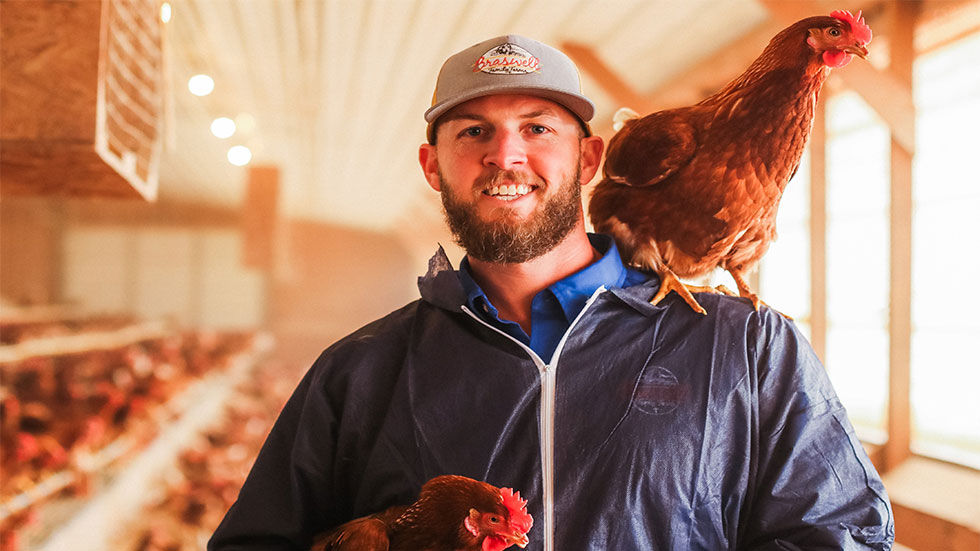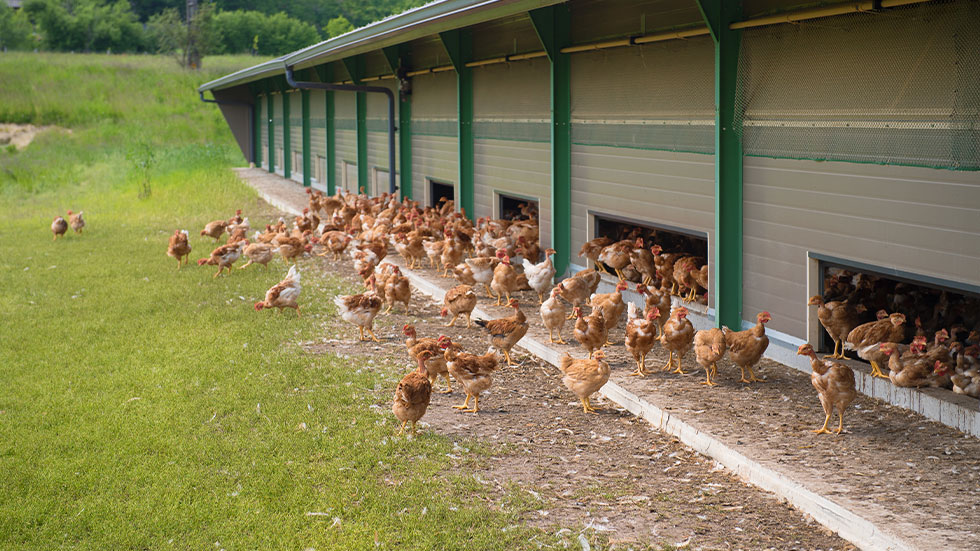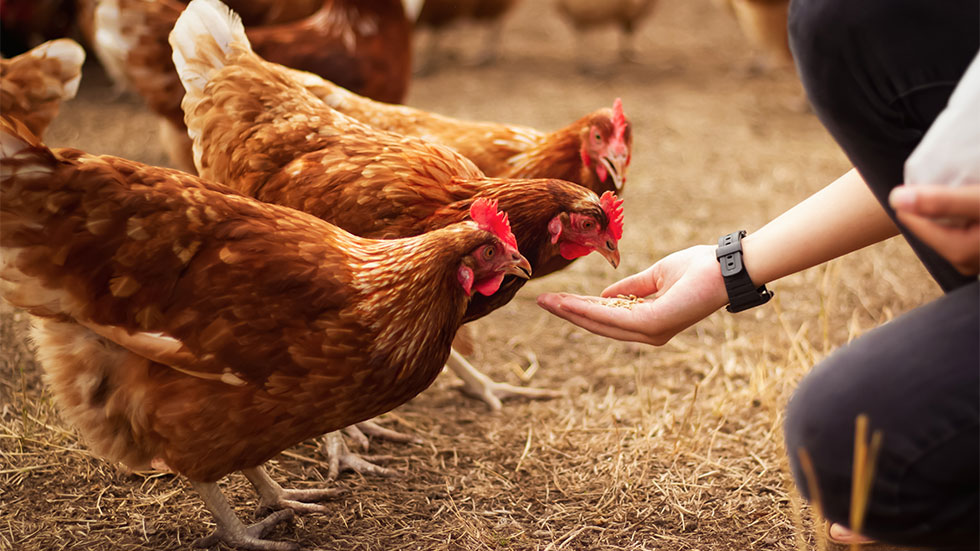Answers to 9 Common Questions About Eggs
Get the details on free range vs. cage-free eggs, what farm fresh and non-GMO mean, and whether you should buy USDA organic


For generations, the perfect egg was white and either Grade AA—the best—or Grade A. Today, supermarkets carry brown eggs and nutrient-enriched eggs. They might be labeled organic eggs, free range, pasture-raised, or cage-free eggs. In this article, we’ll break down the differences of each—as explained by Trey Braswell, the fourth-generation leader of Braswell Family Farms in Nashville, North Carolina, to break down the differences.

Why are some eggs white and some brown?
The chicken breed dictates the eggshell color, he says. And that’s where the differences end.
“Brown and white eggs offer similar ‘egg-cellent’ nutritional profiles,” such as essential proteins, vitamins and minerals, he says. “The choice between brown and white eggs ultimately comes down to the personal preference of the consumer.”
He has hens that produce both colors.
What does a vegetarian-fed hen eat?
These hens eat an all-vegetable, whole-grain diet rich in corn and soy protein, healthy grains, canola oil and a premium supplement of rice bran, alfalfa, sea kelp, and vitamin E, Braswell explains. The hens do not eat animal fat, animal by-products, or fish.
The choice to buy these eggs is more about diet preferences than taste—although that is subjective.
Are "all natural" and "farm fresh" just buzzwords?
There is no standard definition for either term, the egg farmer says. Instead, brands are noting customers’ increasing interest in minimally processed foods.
“'All natural' generally implies that the eggs are in their most natural form—straight from the hen with no further processing,” he says. “'Farm fresh' suggests a shorter time between the egg being laid and its arrival on your grocery store’s shelf.”
Braswell, which is the second-largest Eggland’s Best franchisee, falls into the latter category.
Because there are no industry-wide standards, research the farming practices and production methods of the egg supplier, he suggests.

How do cage-free eggs differ from free-range?
The terms describe the egg-laying hens’ living conditions. Hens that are cage-free—or able to roam—have space to move around inside the barn.
However, free-range hens can roam throughout the barn and within at least 2 square feet of outdoor space per bird.
Hens raised on a pasture have a cage-free barn and 108 square feet of outdoor space.
What's the scoop on nutrient-enriched eggs?
Eggs are already a nutrient-dense food. However, hens fed specialized diets lay eggs with more omega-3 and vitamins E and D.
"Consumers should note the enhanced nutrients to determine if they align with their dietary needs or preferences,” Braswell says.

What is the role of non-genetically modified organisms?
Non-GMO eggs come from chickens fed a diet that’s free from genetically modified organisms, Braswell says. The label is relevant to individuals who wish to avoid GMOs for health or ethical reasons, such as concerns about allergies, cancer, and environmental issues.
Are certifications on the label important?
Various certifications and standards from organizations such as the United Egg Producers, American Humane Farm Program and Humane Farm Animal Care (Certified Humane) provide consumers with assurance regarding the ethical treatment of hens and egg quality, Braswell says.
Criteria can include room for exercise, a nutritious diet and a carefully monitored supply chain.
United Egg Producers, an industry-led initiative, focuses on commercial egg farms. The production system standards are voluntary.
American Humane Farm Program, provided by A Greener World, emphasizes high animal welfare standards, with third-party audits to ensure compliance.
Certified Humane, administered by Humane Farm Animal Care, focuses on providing humane living conditions and undergoes third-party audits to certify farms are meeting specific welfare criteria.
“Understanding these certifications and the organizations behind them empowers consumers to make choices aligned with their values,” Braswell maintains.

Why are eggs graded?
The grading of eggs, ranging from A to B, is based on such factors as shell integrity, yolk quality, and the consistency of the albumen, the clear, viscous fluid found within the egg white and surrounding the yolk.
Braswell Family Farms’ eggs undergo a three-step grading process. First, the eggs are cleaned, sanitized, rinsed, and dried. Next, workers look for imperfections in the integrity, yolk quality, or albumen. Finally, eggs are weighed, sorted and packaged.
AA and A eggs are standard in grocery stores. “Both are near perfect with a normal shape, clean, unbroken shell, minimal staining and a smaller air cell on the inside, Braswell says.
Grade B eggs are still high quality but may not meet the AA/A standards. “They are used for secondary purposes like creating liquid, frozen, or powdered egg products,” he explains.
What makes an egg organic?
USDA organic eggs are from hens raised according to strict organic farming standards that govern the birds’ living conditions and feed. There should be no synthetic pesticides and genetically modified organisms.
“Choosing USDA Organic eggs ensures a commitment to environmental sustainability, animal welfare and the production of eggs free from synthetic additives,” Braswell says. “While organic eggs may come at a higher price point, many consumers find the benefits of supporting organic farming practices—and enjoying eggs produced with a focus on ecological responsibility—to be well worth the investment.”
